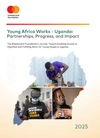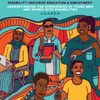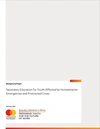Refugees and Displaced Persons
Africa is home to nearly one-third of the world’s refugees and displaced persons.

The Mastercard Foundation seeks to enable 30 million young people, including 2.5 million refugees and displaced persons, 70% of whom are young women, to access dignified and fulfilling work by 2030 as part of the Young Africa Works strategy.
Our approach is underpinned by the belief that young refugees and displaced persons, especially young women, can secure dignified and fulfilling work when they have access to quality education, inclusive transition pathways, and supportive policies.
The strategy is based on three interconnected pillars
-
Secondary Education
Expanding access to, retention in, and the holistic quality of secondary education for displaced youth, with a focus on girls and young women.
-
Transitions to Work
Strengthening and scaling pathways that connect young people to employment, entrepreneurship opportunities, and tertiary education.
-
Policy Implementation
Supporting policy implementation and systems change that allow RDPs to build self-reliant, sustainable futures.

How do we address the displacement crisis? Let’s start by partnering with those who are affected
In Africa — where 44 million people are displaced — every issue is, de facto, a youth issue, given that 70 percent of the population is under the age of 30. Meanwhile, with Africa getting younger and younger in an aging world, and one in four people worldwide set to be African by 2050, African youth have a significant stake and leadership to offer in all global issues.
Learn moreHow We Will Reach Our Goal
-
Expanding Foundation programs in Uganda, Kenya, Rwanda, and Ethiopia, where the Foundation is implementing the Young Africa Works strategy. These programs will support refugees and displaced persons as well as their host communities.
-
Expanding access to skills and entrepreneurship. These programs, implemented by Foundation partners, including UNHCR, Inkomoko and the Amahoro Coalition, seeks to develop skills, transition young refugees and displaced persons into employment or entrepreneurship, and engage the private sector.
-
Enabling refugee-led organizations, as they are trusted by their communities and are already working on innovative solutions. For example, the Foundation is partnering with the Youth Initiative for Development in Africa to provide early childhood education and skills-building to young refugees and host communities in the Kyaka II settlement in Uganda.
-
Expanding access to higher education. In 2019, the Foundation set a target for 25 percent of students recruited into the Mastercard Foundation Scholars Program to be refugees and displaced persons. The Foundation also funds the African Higher Education in Emergencies Network (AHEEN) to support access for these young people to accredited higher education institutions.
Latest Refugees and Displaced Persons Research
View All-
Young Africa Works – Uganda: Partnerships, Progress, and Impact
Education and Transitions Uganda -
Disability-Inclusive Education and Employment: Understanding the Experiences of Young Men and Women with Disabilities - UGANDA
Disability Inclusion Uganda -
A Bridge to the Future: From Higher Education to Employment for Displaced Youth in Africa
Education and Transitions Ethiopia, Nigeria, Uganda, Kenya -
Secondary Education for Youth Affected by Humanitarian Emergencies and Protracted Crises
Education and Transitions
Refugees and Displaced Persons Latest
-
Mastercard Foundation And UNHCR Launch Historic Partnership To Transform Education And Livelihoods For More Than 500,000 Refugees And Displaced Youth In Africa
-
FAWE Malawi Unveils 2024-2028 Strategic Plan and Phase II Partnership with the Mastercard Foundation to Expand Educational Opportunities for Marginalized Youth
-
Our Pledge to Refugee and Displaced Persons
-
University of Rwanda, Mastercard Foundation launch $55 million partnership to develop the next generation of African leaders
-
42,000 Direct Jobs for Vulnerable Groups in Ethiopia will be Created by FDRE Jobs Creation
-
The Investment Case For Africa’s Displaced Women Entrepreneurs
-
Youth Leading the Way: Lessons from the 2025 Refugee Economic Summit
-
Tapping Into Africa’s Refugees: Economic Opportunity Hiding In Plain Sight
-
From Refugee Camp to AI Creator: The Untold Story of Kakuma Girls
-
Request For Expression Of Interest: Youth Enabling Oganization To Support In The Recruitment And Management Of Youth-Led Organizations That Will Accelerate Work Opportunities For Young People In Kenya
-
Request For Expression Of Interest: Gender And Inclusion Technical Partner For The Kenya Country Program

World Refugee Day
At the Foundation, we believe it is impossible to unlock the full economic potential of the continent without harnessing the talents of diverse young people, including refugees and displaced persons.























